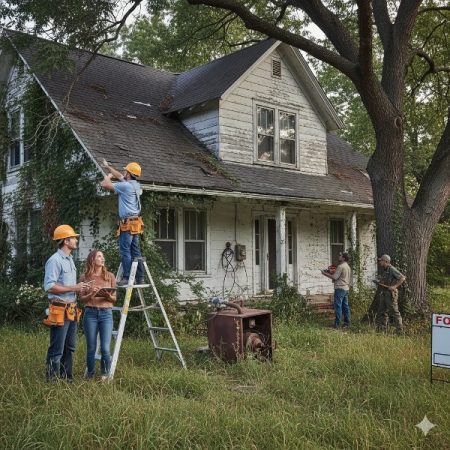Selling a house can be an exciting time, but it can also come with its own set of challenges. One of the biggest decisions you’ll have to make as a seller is what to fix or update before putting your home on the market. While it’s important to make your home appealing to potential buyers, overspending on renovations or fixing the wrong things can hurt your sale.
In this blog post, we’ll explore common mistakes sellers make when trying to fix up their homes and what you should avoid when preparing your house for sale. From over-improvements to emotional attachments, we’ll cover the things you should steer clear of in order to make the most out of your sale.
So, whether you’re a seasoned homeowner or a first-time seller, read on to learn what not to fix when selling a house.
Understanding Your Market
Before putting your home on the market, it’s important to research the local housing market to understand better what homes in your area are selling for. This will give you a good idea of what you can realistically ask for your own home. Look at recent sales of similar homes in your neighborhood, market trends, and any local real estate market changes. This will help you price your home competitively and attract potential buyers.
Knowing who your target buyer is can help you tailor your home’s features and appeal to their specific needs and wants. For example, if your home is in a family-friendly neighborhood, you may want to highlight the spacious bedrooms and backyard for families with children. Understanding your target demographic will help you make the most of your home’s selling points.
Setting the right asking price for your home can be a delicate balance between getting the most money for your property and attracting potential buyers. While asking for a higher price may be tempting, setting your asking price too high can turn off potential buyers and make your home sit on the market for a long. On the other hand, pricing too low can leave money on the table. It’s important to find a balance by setting a realistic asking price based on your research on the local housing market and your target buyer demographic.
If you’re looking to sell your house quickly, it would be a great step to get a quote from a sell-house fast company, such as Property Rescue, and other sources you can find on the internet.
Over-improvements
While updating your home before selling can be a great way to increase its value, overspending on renovations can have the opposite effect. Not all home improvements are created equal, and some can actually decrease the value of your home if they don’t align with the style or market trends in your area. It’s important to strike a balance between making updates that will increase your home’s appeal and not overspending on renovations that may not bring a good return on investment.
Some common over-improvements that can decrease the value of a house include adding luxury features that are different from the rest of the homes in the neighborhood or doing renovations that are too personal and don’t appeal to a wide range of buyers. Another over-improvement to avoid is investing in a complete kitchen or bathroom overhaul outside your home’s style or price range.
The key to successful home updates is to balance your tastes and preferences with market trends and the needs of potential buyers. Instead of going for the latest and greatest trends, focus on making practical updates that will appeal to a wide range of buyers and increase the value of your home. This can include repainting, replacing outdated fixtures, or adding energy-efficient appliances. By balancing updates with market trends, you’ll be able to make the most out of your home sale.
Emotional Attachments
When selling a home, it’s important to detach emotionally from the property. This can be a challenge, especially if you’ve lived in the home for many years and have built strong emotional attachments to it. However, these attachments can cloud your judgment and make it difficult to see the house objectively. As a result, it can be harder to make the necessary updates and changes to make the house appealing to potential buyers.
Detaching emotionally from your home can be a process, but you can take steps to make it easier. Try to focus on the positive aspects of the move, such as a new home or new beginnings. Surround yourself with supportive friends and family, and consider working with a professional to help you through the process.
To make your home more appealing to potential buyers, it’s important to neutralize any personal touches that may detract from its appeal. This can include removing family photos, personal artwork, and other items that are too personal. Consider repainting walls with neutral colors, removing any bold wallpaper, and making other changes to help create a blank canvas for potential buyers to envision their style in the home. By neutralizing personal touches, you’ll make it easier for potential buyers to see themselves in the space and imagine making it their own.
Ignoring Major Defects
Ignoring major defects in your home can have a significant impact on the sale. It’s important to address these issues before putting your home on the market, as they can detract from its appeal and potentially lower the sale price. Buyers will be more likely to see your home as a fixer-upper and either walks away from the sale or negotiate a lower price.
Some common major defects that can negatively impact the sale of a home include a leaky roof, outdated electrical or plumbing systems, and structural damage. These issues can be costly to repair and detract from your home’s overall appeal. It’s important to address these issues before listing your home to avoid potential roadblocks during the sale.
Addressing major defects can be expensive, but it’s important to find a balance between making cost-effective repairs and making your home appealing to buyers. Focus on making the necessary repairs to make your home safe and functional while considering updates that will improve its overall appeal. For example, you may want to replace old, outdated appliances with more energy-efficient models, or repaint the walls with a fresh, neutral color. By balancing cost-effective repairs with the need to make your home appealing, you’ll be able to increase its value and make it more appealing to potential buyers.
Conclusion
In conclusion, you must be strategic about which updates and repairs you make when selling a house. There are many pitfalls to avoid, from overspending renovations to ignoring major defects. Instead, focus on researching your local housing market and setting a realistic asking price, detaching emotionally from your home, and making cost-effective repairs that will improve its overall appeal.
By following these guidelines, you can increase the value of your home and make it more appealing to potential buyers, helping to ensure a successful sale.






